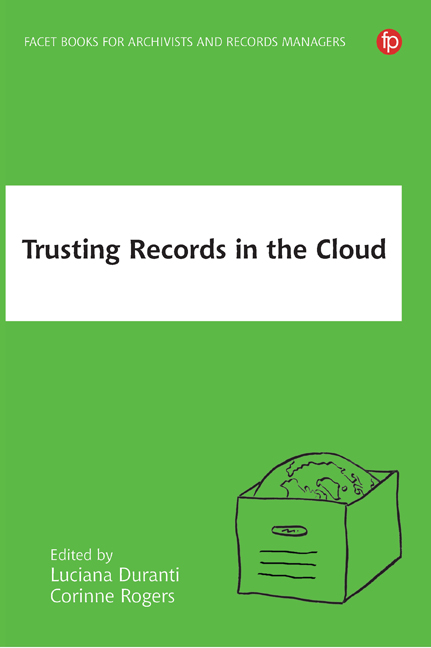Book contents
- Frontmatter
- Contents
- List of Figures and Tables
- Contributors
- 1 Introduction
- 2 The Cloud – Challenges and Issues
- 3 Open Government
- 4 Citizen Engagement
- 5 Strategies, Methods and Tools Enabling Records Governance in a Cloud Environment
- 6 Retention and Disposition
- 7 Authentication
- 8 Intellectual Control
- 9 Exploring Digital Preservation in the Cloud
- 10 Cultural Heritage – Indigenous Perspectives
- 11 The Role of the Records Professional
- 12 Education
- Appendix 1 InterPARES Trust Terminology
- Appendix 2 Products of InterPARES Trust Research
- Index
10 - Cultural Heritage – Indigenous Perspectives
Published online by Cambridge University Press: 24 September 2019
- Frontmatter
- Contents
- List of Figures and Tables
- Contributors
- 1 Introduction
- 2 The Cloud – Challenges and Issues
- 3 Open Government
- 4 Citizen Engagement
- 5 Strategies, Methods and Tools Enabling Records Governance in a Cloud Environment
- 6 Retention and Disposition
- 7 Authentication
- 8 Intellectual Control
- 9 Exploring Digital Preservation in the Cloud
- 10 Cultural Heritage – Indigenous Perspectives
- 11 The Role of the Records Professional
- 12 Education
- Appendix 1 InterPARES Trust Terminology
- Appendix 2 Products of InterPARES Trust Research
- Index
Summary
Introduction
This chapter summarises findings from two InterPARES Trust (hereinafter ITrust) research projects that are particularly relevant to the work of libraries, archives and museums, the institutions that constitute the cultural heritage sector. In Canada, researchers explored the extent to which pluralised pers - pectives were reflected in the early policies of a cultural heritage institution – a court mandated centre tasked with acknowledging a history of violence, while firmly rooted in that history. New Zealand researchers considered issues relating to trust from the perspective of Indigenous views of digitised language resources. These studies reflect the differing priorities and concerns of the regions in which they were based, nevertheless both have findings that are relevant to other countries and jurisdictions.
Multiple and diverse perspectives
Archives and archivists play critical roles in ensuring that national memories do not solely represent dominant or majority perspectives. As conjectured by Anne Gilliland and colleagues:
… recordkeepers and archivists play a central role in shaping cultural identity and memory, forming national historical legacies, and ensuring societal and institutional accountability through their role in capturing, managing, and preserving records and making them accessible to users.
(Gilliland et al., 2008, 88)
The extent to which this happens in everyday practice will undoubtedly influence trust in the institutions enabling access to cultural heritage. The digital environment provides considerable opportunities to work with a broader range of communities and perspectives than many archives and archivists have in the past. Research in Canada and New Zealand provides further insight into the issues and challenges involved in this complex area.
Canada: policy and plurality
Researchers in Canada undertook a case study of the National Centre for Truth and Reconciliation (NCTR), Winnipeg, Manitoba, investigating how making information digitally accessible influenced initial steps to address issues of plurality and trust related to records made available by the NCTR. The following background provides a historical account of the context leading to the establishment of the NCTR as it is critical to acknowledge and understand the resilience of the Indigenous peoples in that nation-state, the multitude of harms, abuse and denial that the NCTR exists to address and the ongoing influence of practices and institutions with colonial foundations.
- Type
- Chapter
- Information
- Trusting Records and Data in the Cloud , pp. 207 - 222Publisher: FacetPrint publication year: 2018



